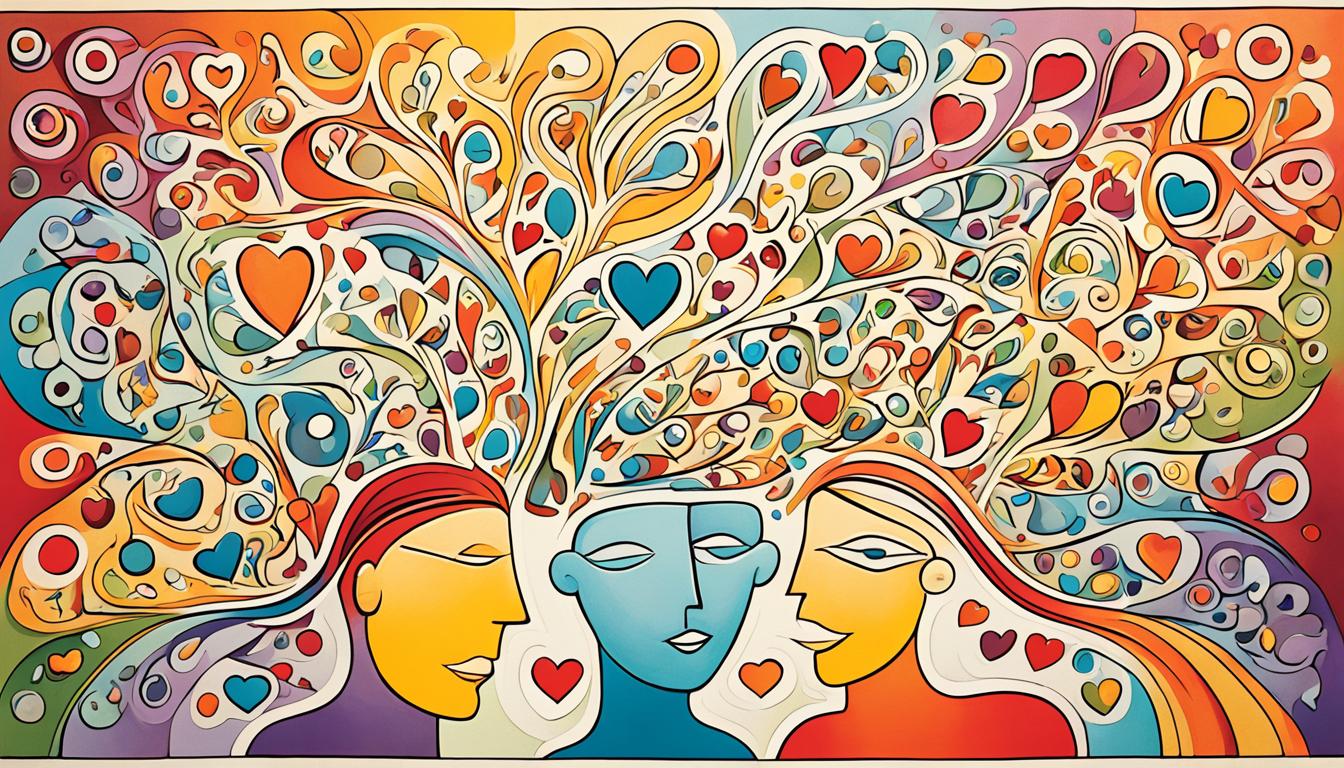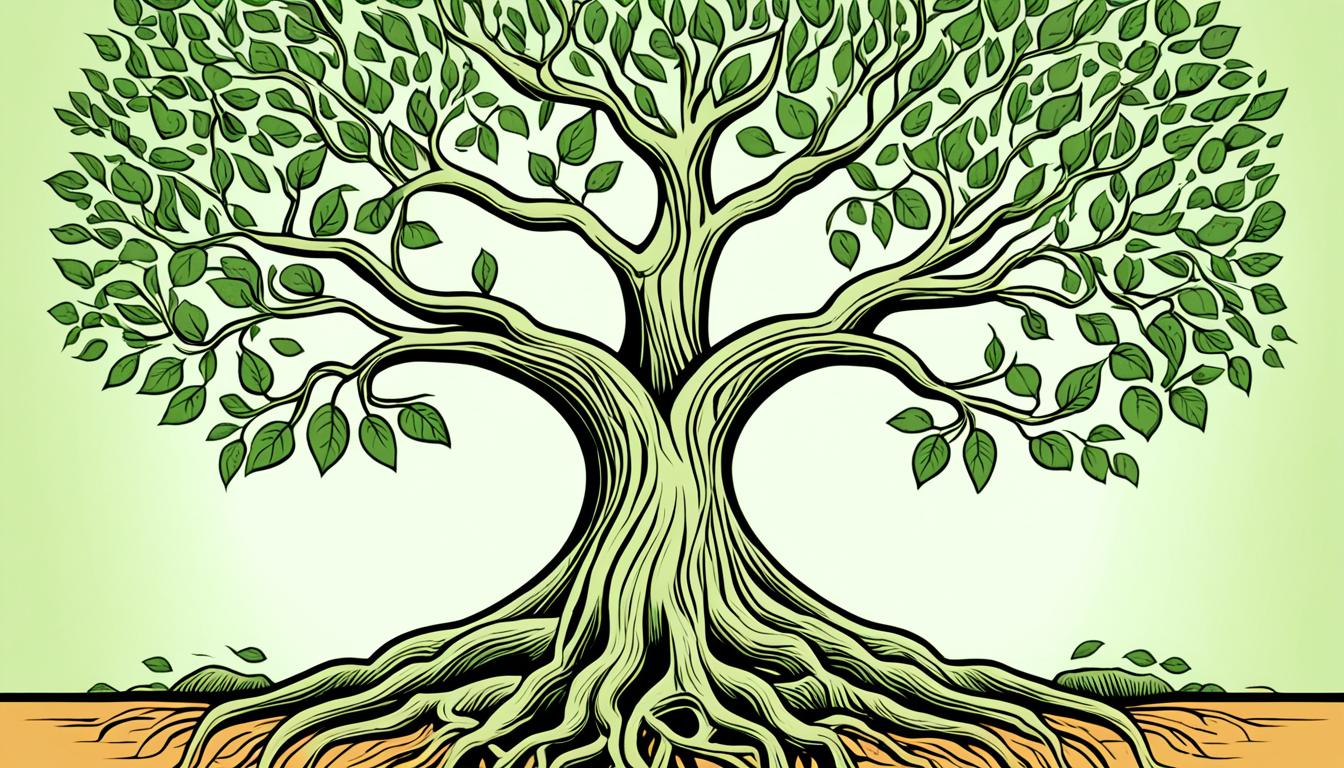Love is a journey that takes us on a rollercoaster of emotions, from the exhilarating rush of infatuation to the comforting warmth of deep connection. It is a universal desire to find someone who understands us, loves us for who we are, and walks beside us through life’s ups and downs. But how do we navigate this complex terrain of love and relationships?
Understanding the intricacies of love and relationships is crucial for building strong and meaningful connections. It goes beyond the superficiality of dating and delves into the depths of emotional bonding, healthy communication, and building trust. Whether you are starting a new relationship or looking to enhance an existing one, this comprehensive guide will provide you with the insights and tools you need to navigate the path to lasting love.
Key Takeaways:
- Dating and romance are distinct concepts, with dating serving as a precursor to romance.
- Understanding the stage of your relationship is crucial for taking the next steps.
- Challenges in dating vary across age groups, such as navigating the dating scene in your 30s and 40s.
- Building long-lasting relationships requires effort and commitment from both partners.
- Communication skills, empathy, compromise, and humor are key ingredients for successful relationships.
The Difference Between Dating and Romance
When it comes to matters of the heart, understanding the distinction between dating and romance is essential. While these terms are often used interchangeably, they actually represent two distinct aspects of the journey to finding love. Let’s explore the difference between dating and romance and how they shape our relationships.
Dating: Exploring Potential Connections
Dating involves social activities that two individuals engage in to explore a potential romantic relationship. It is a phase of courtship where partners get to know each other, embark on social activities together, and assess their compatibility. Whether it’s going out for dinner, catching a movie, or simply spending time getting to know each other, dating is about building a foundation for future romantic connections.
Dating can take place in various settings, both public and private. It provides an opportunity for individuals to learn about each other’s interests, values, and personalities. Through these social activities, attraction and chemistry can blossom, leading to the potential for a deeper emotional connection.
“The dating phase can lead either to a long-term relationship or to the partners going their separate ways, highlighting the uncertainty in dating outcomes.”
Research shows that attraction plays a significant role in mate selection, influencing the progression of relationships. As individuals date, they assess the compatibility of their values, goals, and lifestyles, facilitating the decision to either pursue a deeper commitment or to move on.
Romance: The Excitement and Mystery of Love
Romance, on the other hand, is an abstract feeling associated with love. It is the enchanting realm of emotions, where excitement, passion, and mystery intertwine. While dating involves tangible actions and shared experiences, romance transcends the physical and delves into the depths of our emotions.
In relationships, partners convey love through their words and actions, fostering emotional connections and demonstrating commitment. Declarations of love, which are more common in relationships compared to dating, serve as vital components in keeping the flame of love alive.
In a committed relationship, you can expect your partner to be by your side, considering your needs and supporting you through life’s ups and downs. This higher level of commitment and support distinguishes relationships from the more exploratory nature of dating.

“In relationships, partners convey love through words and actions, highlighting emotional connection and commitment.”
Moreover, while dating allows for the exploration of multiple partners without commitment, relationships are characterized by exclusivity and a deeper level of commitment to one partner. In relationships, planning for the future together becomes more prevalent, with discussions about living arrangements, long-term goals, and even children being common.
The Dating vs. Relationship Dilemma
It’s important to note that the journey from dating to a committed relationship can vary in length. On average, it takes couples around 5 years to date before progressing to marriage or long-term commitment. This duration highlights the importance of the dating phase in laying a solid foundation for a lasting relationship.
Additionally, some individuals may choose to date casually for personal reasons such as gaining experience, enjoying physical intimacy, or avoiding serious attachments. This reflects the varied motivations behind dating, which go beyond solely seeking committed relationships.
The dating process typically involves four stages that showcase the evolving dynamics within relationships. These stages include the initial awkwardness, growing attraction, confusion about a future together, and ultimately, intimacy. Each stage brings new challenges and opportunities for growth.
“The 4 stages of dating involve phases such as the initial awkwardness, growing attraction, confusion about a future together, and intimacy, showcasing the evolving dynamics within the dating process.”
Whether you find yourself in the dating or romance phase of your love journey, it’s important to navigate these stages with an open heart, effective communication, and an understanding of your own desires and needs. Remember, love is a complex tapestry of emotions, experiences, and connections that can shape and transform our lives.
Dating as an Adult in Your 30s and 40s
Dating in your 30s and 40s brings a unique set of challenges and considerations. Unlike when you were younger, you now have more life experience, clearer goals, and a better understanding of yourself. However, you might also encounter a smaller dating pool and a sense of urgency to find a partner. Despite these challenges, dating as an adult can be a rewarding and fulfilling experience.
One important aspect to consider when dating in your 30s and 40s is the changing landscape of relationships. Around 26% of Americans aged 30 to 39 and about 27% of individuals aged 40 to 49 have never been married, indicating that a significant percentage of adults in these age groups remain single. This means that there are plenty of other adults in the same situation as you, looking for companionship and love.
It’s also worth noting that the average age at first marriage has been steadily increasing in the United States. Data shows that the median age for men is around 30 and for women is around 28. This trend towards delaying marriage suggests that more individuals are focusing on personal and professional growth before committing to a long-term relationship.
Research reveals that marrying young can increase the risk of divorce. Approximately 60% of marriages involving individuals under 25 years old end in divorce, highlighting the challenges faced by those who marry at a younger age. By waiting until your 30s or 40s to enter into a committed relationship, you may have a better understanding of yourself and what you want in a partner, increasing the likelihood of a successful and fulfilling partnership.
Another important aspect to consider is the rise in individuals seeking therapy or counseling to address relationship issues. Data shows that adults in their 30s and 40s are engaging in therapy to navigate dating and relationship challenges. Seeking professional support can provide valuable insights, help you work through any emotional baggage, and improve your communication skills.
Financially, being single can have its own implications. As a single adult, you bear the full burden of expenses such as housing, travel, and leisure activities. This can be both a challenge and an opportunity to focus on personal growth, financial stability, and exploring new experiences.
Online dating has become a prevalent method for adults in their 30s and 40s to meet potential partners. Approximately 40% of American adults use online dating platforms to find romantic connections. These platforms offer a convenient way to meet like-minded individuals and expand your dating horizons.
The dating landscape for adults in their 30s and 40s can be uncertain and emotionally complex. It’s common to grapple with self-doubt, vulnerability, and the challenges of balancing personal growth with relationship expectations. However, it’s important to approach dating with an open mind, patience, and a willingness to take risks.
In the provided material, the individual expressed concerns about finding love at their age. It’s important to remember that love can happen at any age, and focusing on your own happiness and growth will attract the right person into your life. A friend suggested that the person’s dating criteria might be aimed at hitting the world’s smallest target, indicating the importance of being open to different possibilities and not limiting yourself to a specific checklist.
Like many adults in their 30s and 40s, Lauren, a 35-year-old woman, has experienced the challenges of modern courtship. She found dating apps to be like the longest unpaid internship of her life, going on many uninspiring dates due to societal pressure. It’s important to stay true to yourself and not settle for anything less than what you deserve.
To navigate the challenges of dating as an adult in your 30s and 40s, here are some tips:
- 1. Be clear about your goals and what you want in a partner.
- 2. Be honest with yourself and potential partners about your expectations and intentions.
- 3. Take your time and don’t rush into a relationship.
- 4. Focus on personal growth and pursue activities that bring you joy and fulfillment.
- 5. Don’t be afraid to seek therapy or counseling to navigate any emotional baggage or relationship challenges.
- 6. Embrace online dating as a tool for meeting new people and expanding your options.
- 7. Stay true to yourself and don’t settle for anything less than what you deserve.
Remember, dating as an adult in your 30s and 40s can be an exciting journey filled with new experiences and opportunities for personal and emotional growth. By navigating the challenges with an open mind, patience, and self-discovery, you can find meaningful connections and a fulfilling romantic partnership.

How to Build Long-Lasting Relationships at Any Age
In today’s fast-paced world, building long-lasting relationships can seem like a daunting task. However, with the right approach and mindset, it is possible to create meaningful connections that stand the test of time. Whether you’re in your 20s or 50s, the key to building a lasting relationship lies in effective communication, compromise, empathy, and a good sense of humor.
First and foremost, strong communication skills are essential in any relationship. It’s important to express your feelings, needs, and wants openly and honestly, while also being a good listener to your partner. Effective communication allows for understanding, builds trust, and fosters emotional intimacy.
“Good men and good women are everywhere,” says Bela Gandhi, founder of the Smart Dating Academy in Chicago. She emphasizes the need to break free from our devices and engage in real-life interactions, making eye contact with potential partners to signal openness to conversation and connection.
Another crucial aspect of building long-lasting relationships is the ability to compromise. Each person in the relationship has their own needs and desires, and finding a middle ground where both partners feel satisfied is key. It’s important to be willing to give and take, and to find solutions that work for both individuals.
“In a partnership, seeking romance is for dates, but partnership is crucial for enduring rough times,” advises Tina B. Tessina, a California psychotherapist. This highlights the importance of navigating the challenges of life together as a team, rather than solely focusing on the romantic aspects of the relationship.
Empathy is also a fundamental quality that contributes to the longevity of a relationship. Being able to put yourself in your partner’s shoes and understand their perspective fosters a sense of emotional connection and promotes harmony in the relationship.
“While opposites may attract initially, long-term relationships are smoother when partners share similar values and beliefs,” cautions Dr. Gail Saltz, a New York psychiatrist. Building a relationship with a strong foundation of shared values creates a sense of alignment and understanding, reducing future conflicts and disagreements.
Finally, a good sense of humor can work wonders in a long-lasting relationship. Laughter brings joy and lightness, and helps to navigate challenges with greater ease. Being able to find humor in both the good and bad times creates a bond that can weather any storm.
Remember, relationships are a basic human need and have the power to bring people together through tough times. By prioritizing effective communication, embracing compromise, cultivating empathy, and adding a touch of humor, you can lay the groundwork for a strong and long-lasting connection with your partner.

| Expert Advice | |
|---|---|
| Bela Gandhi, founder of the Smart Dating Academy in Chicago | “Good men and good women are everywhere.” |
| Tina B. Tessina, California psychotherapist | “In a partnership, seeking romance is for dates, but partnership is crucial for enduring rough times.” |
| Dr. Gail Saltz, New York psychiatrist | “While opposites may attract initially, long-term relationships are smoother when partners share similar values and beliefs.” |
The Science Behind Millennial Relationships
Millennials approach relationships with a unique set of values and priorities influenced by societal shifts and evolving technology. They prioritize personal growth, shared values, and non-traditional relationship structures, creating a distinct dynamic in the realm of love and romance. However, they also face challenges that are specific to their generation.
The Impact of Technology
Technology has played a significant role in shaping millennial relationships. With the advent of online dating sites and mobile apps, millennials have more dating choices than ever before. Platforms like Tinder, launched in 2012, have gained immense popularity and currently have 57 million users worldwide, with a significant percentage of users in the United States being college students aged 18 to 24. While these technologies offer convenience and the potential for connection, they can also lead to feelings of being overwhelmed, uncertain, and anxious due to the abundance of choices.
According to a study on loneliness, excessive and unhealthy internet use, such as swiping through dating apps, can increase feelings of loneliness over time. Paradoxically, the popularity of dating apps is associated with a decline in dating and sexual activity among teenagers and young adults. In 2015, only 56 percent of high school seniors had been on dates, compared to 85 percent of boomers and Gen X.
Despite the challenges posed by technology, millennials value genuine experiences and are cautious of artificial interactions facilitated by geolocation or online matching algorithms. They strive for authenticity and transparency in their relationships, prioritizing meaningful connections over surface-level encounters.
The Role of Societal Shifts
Millennials grew up during a time of significant societal shifts, which has shaped their approach to love and relationships. Unlike previous generations, millennials are less inclined to idealize marriage as the ultimate goal. Instead, they focus on finding the right partner for marriage, valuing compatibility and personal fulfillment in their long-term partnerships. This shift in mindset is influenced by factors such as career aspirations, personal growth, and the desire to explore non-traditional relationship structures.
Additionally, millennials often feel societal pressure to find ‘The One’ and settle down before reaching the age of 30. This self-imposed deadline can create heightened expectations and, at times, lead to unnecessary stress in dating and relationship experiences.
The Contrast with Generation Z
Millennials, often referred to as pioneers of the online dating scene, paved the way for Generation Z, who grew up immersed in a digital world. While millennials prioritize personal growth, Gen Z is more inclined to seek financial stability over their dream job. They are politically aware and unafraid to address societal issues such as racial inequality, LGBTQ+ rights, and climate change. Gen Z also focuses on intersectionality, recognizing how race, sexuality, and gender intersect to shape individual experiences.
Unlike millennials, Gen Z uses social media as a platform for raw, unfiltered expression, while millennials tend to curate their online presence. Gen Z has also normalized conversations around mental health, focusing on self-care, setting boundaries, and seeking help when necessary. Additionally, sustainability and eco-friendly gestures play a significant role in Gen Z’s approach to love and relationships, reflecting their commitment to creating a better world.
Overall, understanding the science behind millennial relationships sheds light on their unique values, challenges, and aspirations. By embracing authenticity, nurturing personal and shared growth, and navigating the digital landscape with intention, millennials can forge meaningful connections that withstand the test of time.

| Statistics | Insights |
|---|---|
| Marriage in American society has been steadily declining since 1960, with millennials being 10 to 20 percent less likely to have wed in their 20s compared to their parents. | Millennials are redefining the concept of marriage and prioritizing personal growth before settling down. |
| The median age at first marriage is now the highest in modern history, with it being 29 for men and 27 for women. | Millennials are getting married at a later age, reflecting their focus on personal and professional development. |
| Despite 69 percent of millennials expressing a desire to get married, economic barriers play a significant role, with wealthier millennials marrying at a higher rate than their less affluent peers. | Economic factors impact millennial marriage rates, highlighting the influence of financial stability on relationship choices. |
| Tinder, launched in 2012, has 57 million users globally, with 35 percent of the users in the United States being college students aged 18 to 24. | Online dating has provided millennials with a plethora of dating choices, but it can also lead to feelings of overwhelming decison-making. |
| A 2014 study on loneliness indicates that excessive and unhealthy internet use, such as swiping through dating apps, can increase feelings of loneliness over time. | While technology facilitates connections, it can also contribute to feelings of isolation and loneliness. |
| The popularity of dating apps is paradoxically associated with a decline in dating and sexual activity among teenagers and young adults. | The availability of dating apps has not necessarily led to an increase in traditional dating and sexual activity among younger generations. |
| Only 56 percent of high school seniors in 2015 had been on dates, compared to 85 percent of boomers and Gen X. | Younger generations are engaging in traditional dating rituals at a lower rate than older generations. |
| Nearly 1 in 4 young adults experienced celibacy in 2018, a significant increase compared to previous generations. | Mindful exploration and intentional choices related to intimacy are becoming more prevalent among millennials. |
| PSYC 126: “Attraction and Relationships” class saw 400 students attend the first day, significantly more than anticipated by the lecturer. | Interest in understanding and navigating relationships is high among millennials. |
Key Features of Millennial Relationships
Millennial relationships are shaped by a combination of cultural and societal influences, as well as unique generational factors. These relationships have distinct features that set them apart from previous generations.
Authenticity and Transparency
Millennials value authenticity and transparency in their relationships. They prioritize partners who are open-minded, genuine, and willing to communicate openly. This emphasis on authenticity allows for deeper emotional connections and fosters a sense of trust and understanding.
Digital Connectivity
Technology plays a central role in millennial relationships. Social media and dating apps have not only transformed the way millennials meet and connect with potential partners but also shaped their approach to dating and relationships. Digital connectivity allows for constant communication, sharing of experiences, and the ability to stay connected even when physically apart.
“Technology has given us the ability to be in constant contact with our partners, but it’s important to strike a balance between digital connectivity and real-world intimacy.”
Flexibility
Millennials prioritize flexibility in their relationships. They seek partners who understand the importance of work-life balance and support their personal and professional development. Flexibility in terms of work arrangements, living situations, and relationship structures allows millennials to navigate the evolving demands of modern life while maintaining strong connections with their partners.
Embracing Non-traditional Relationship Structures
Millennials are more inclined to embrace non-traditional relationship structures, such as open relationships, polyamory, or living apart together. They prioritize compatibility, shared values, and personal growth over traditional markers of success or societal expectations. This openness to alternative relationship structures reflects millennials’ desire for autonomy, personal freedom, and the ability to define their own relationship dynamics.
Overall, millennial relationships are characterized by a desire for authenticity, a reliance on digital connectivity, a need for flexibility, and a willingness to explore non-traditional relationship structures. Millennials prioritize personal growth, shared experiences, and open communication, seeking relationships that align with their evolving values and aspirations.

Challenges in Millennial Relationships
Millennials, born between 1981 and 1996, dominate the dating scene and navigate the complexities of long-term commitments. However, they face unique challenges that shape their relationship dynamics. The digital age, financial pressures, and delayed marriage and parenthood impact millennial relationships in significant ways.
Digital Distraction
In today’s technology-driven world, digital distraction poses a challenge for millennials in their relationships. The constant presence of smartphones, social media, and digital platforms can lead to a disconnect between partners. It becomes essential to set boundaries, designate tech-free zones, and prioritize quality time without distractions to foster meaningful connections.
Financial Pressures
Millennials often face financial pressures that impact their relationship dynamics. Factors such as student loan debt, stagnant wages, and the high cost of living can strain partnerships. It is vital for couples to have open and honest conversations about money, budgeting, and financial goals to navigate these challenges together.
Delayed Marriage
Compared to previous generations, millennials tend to delay marriage and parenthood in favor of career advancement and personal growth. This delay can introduce complexities related to timing and family planning. Couples must have open discussions about their timelines, values, and aspirations to ensure they are on the same page and can navigate these challenges in a supportive and understanding manner.
By acknowledging and addressing these challenges in millennial relationships, couples can develop strategies and implement healthy practices that foster strong connections, resilience, and personal growth.

| Generation | Median Age of First Marriage |
|---|---|
| Millennials | 29 for men, 27 for women |
| Previous Generations | Lower than millennials |
Strategies for Cultivating Healthy Millennial Relationships
When it comes to building healthy relationships, millennials have their own unique set of challenges and opportunities. Prioritizing open communication, setting boundaries around technology, fostering personal and shared growth, and cultivating gratitude and appreciation can pave the way for thriving connections in the digital age.
Prioritize Open Communication
Communication is the foundation of any healthy relationship. For millennials, who grew up in a digital era, it’s important to prioritize open and honest dialogue with your partner. Take the time to actively listen, express your thoughts and feelings, and create a safe space for mutual understanding and connection. By engaging in healthy communication, you can navigate challenges, resolve conflicts, and build a deeper emotional bond.
Set Boundaries Around Technology
The ubiquity of smartphones and social media platforms can be both a blessing and a curse in millennial relationships. While technology facilitates communication and connection, it can also lead to digital distraction and disconnect. Establishing digital boundaries, such as designated tech-free zones or offline quality time, can help foster real-world intimacy and prevent distractions from interfering with your relationship’s growth.
Foster Personal and Shared Growth
Millennials often prioritize not only their romantic relationships but also their personal and professional development. Embrace personal growth opportunities, pursue your passions, and encourage your partner to do the same. By nurturing your individual aspirations while fostering shared goals and dreams, you can create a supportive and fulfilling environment that allows both of you to thrive.
Cultivate Gratitude and Appreciation
In the midst of busy lives and digital distractions, it’s important to take the time to express gratitude and appreciation for your partner. Simple acts of kindness and heartfelt acknowledgement can strengthen emotional bonds and foster a sense of mutual respect and love. By cultivating gratitude and appreciation, you can create a positive and nurturing atmosphere within your relationship.
Remember, building healthy millennial relationships requires effort, commitment, and a willingness to adapt and grow together. Seek professional support, such as couples counseling, if needed, to navigate challenges and strengthen your bond. By incorporating these strategies into your relationship, you can cultivate a foundation of love, respect, and shared growth that will stand the test of time.

The Importance of Authenticity and Transparency
Authenticity and transparency are fundamental elements for building trust, intimacy, and meaningful connections in relationships. Being genuine and open-minded allows for honest and meaningful interactions where thoughts and feelings can be openly communicated.
Authenticity promotes personal growth and development and fosters psychological safety within relationships. It acknowledges that individuals cannot always meet unrealistic standards of transparency, but strive to be their “best selves” to promote growth and trust.
Self-awareness plays a vital role in authenticity. Understanding one’s values, beliefs, and emotions helps maintain genuine interactions and promotes a deeper understanding between partners.
Honesty is a cornerstone of authenticity. Building trust through truthful communication is essential for fostering meaningful connections. Consistency between words and actions demonstrates integrity, making it easier for others to trust and understand you.
The Gardner-McCauley research team argues that authenticity promotes personal growth and development.
Vulnerability is another component of authenticity that leads to deeper connections. Sharing fears, insecurities, and imperfections allows for growth and mutual understanding.
Respecting boundaries, sharing appropriately, and showing gratitude are all integral to authentic relationships. Accepting and embracing differences, acknowledging unique perspectives and values while fostering inclusivity, is crucial in building genuine connections.
Listening and empathy are essential in authentic communication. They contribute to understanding and encourage the development of deeper connections within relationships.
Open and empathetic communication creates emotional intimacy and fosters a safe space for expression in relationships.
Embracing imperfection is an important aspect of authenticity. Recognizing that nobody is perfect and allowing for forgiveness and acceptance of flaws, both in oneself and others, strengthens the authenticity within a relationship.
The concept of love languages, developed by Dr. Gary Chapman in 1992, offers insight into different communication styles and emotional needs within relationships. Understanding and incorporating love languages can enhance communication and strengthen emotional connections.
Love languages provide ways for individuals to express and receive love, indicating different communication styles within relationships.
Effective communication, transparency, and authenticity are key factors in nurturing strong bonds and experiencing greater satisfaction within relationships.

| Authenticity and Transparency | Benefits |
|---|---|
| Promotes personal growth and development | Enhances psychological safety |
| Builds trust and intimacy | Fosters meaningful connections |
| Encourages mutual understanding | Strengthens emotional bonds |
| Shows integrity and builds trust | Promotes honesty in communication |
| Allows for vulnerability and growth | Deepens connections |
| Respects boundaries and fosters inclusivity | Cultivates a sense of belonging |
| Promotes active listening and empathy | Enhances understanding and connection |
Balancing Digital Connectivity and Real-World Intimacy
In today’s digital age, technology has greatly enhanced our ability to connect with others. Communication through technology has increased by 53% compared to a decade ago, allowing for more frequent interactions across geographical boundaries.
While this digital connectivity has its advantages, it’s essential to strike a balance between staying connected online and nurturing real-world intimacy in our relationships. Finding the right equilibrium can help us maintain strong, meaningful connections.
78% of individuals in long-distance relationships report feeling closer to their partners due to constant communication facilitated by technology. This constant connection fosters a sense of closeness and alleviates the challenges of physical distance.
“Technology has made it so much easier for us to bridge the distance. We can share our daily lives, thoughts, and emotions, and it feels like we’re right there with each other,” says Sarah, who has been in a long-distance relationship for over a year.
However, it’s important to acknowledge the concerns that individuals in relationships express about the lack of authenticity in online interactions, affecting trust levels. According to a study, 64% of individuals worry about the authenticity of online interactions and how they may impact their relationship dynamics.
Social media also plays a significant role in influencing relationships. Social media-induced FOMO (fear of missing out) impacts 70% of relationships, leading to feelings of inadequacy and pressure to maintain a curated digital image.
Additionally, excessive screen time during face-to-face interactions can negatively impact the quality of these moments. 82% of couples note a decline in the quality of face-to-face interactions due to excessive screen time during meetings.
Finding Balance: Digital Connectivity and Real-World Intimacy
To create a healthy balance between digital connectivity and real-world intimacy, consider the following strategies:
- Designate tech-free zones: Set aside dedicated time and spaces where technology is kept aside, allowing for quality time without distractions.
- Prioritize in-person interactions: Make a conscious effort to prioritize face-to-face interactions over virtual ones. This can include date nights, engaging in shared activities, and actively listening to one another.
- Avoid social media comparisons: Understand that social media often portrays idealized versions of reality and contributes to unrealistic relationship expectations and body image concerns. Focus on your own journey and appreciate the depth of your real-world connections.
- Mindful technology use: Be mindful of your technology use and recognize triggers for negative emotions. Set boundaries for screen-free time and allocate time for genuine, uninterrupted presence with your partner.
By striking a balance between digital connectivity and real-world intimacy, you can foster emotional closeness, strengthen trust, and create a more meaningful and fulfilling relationship.

Nurturing Personal and Professional Growth in Relationships
Millennial relationships thrive when partners support each other’s personal growth and professional development. By nurturing individual passions while fostering shared goals and dreams, couples can strengthen their bond and create a solid foundation for a successful and fulfilling relationship.
Research shows that strong relationships positively impact personal well-being and quality of life. A significant percentage of people believe that relationships play a crucial role in their overall happiness and satisfaction.
However, conflicts in relationships often arise due to a lack of understanding personal development. When individuals neglect their own growth or fail to support their partner’s aspirations, it can lead to misunderstandings, frustrations, and even resentment. Relationships can suffer when personal growth takes a back seat.
Understanding the importance of personal growth
In a healthy and thriving relationship, both partners should prioritize their personal growth. This involves setting goals, pursuing passions, and continuously striving for self-improvement. When partners embrace personal growth, they bring new experiences, knowledge, and perspectives into the relationship, fostering growth as a couple.
By actively supporting each other’s professional development, couples can create a collaborative environment that encourages success and achievement. A deep understanding of each other’s goals and aspirations can lead to stronger emotional bonds and a sense of shared purpose.

Creating unique experiences
Relationships that prioritize personal and professional growth often involve actively creating unique experiences together. Rather than falling into a monotonous routine, couples seek out new adventures, learn and grow together, and continually challenge themselves.
Comparative analysis shows that relationships where unique experiences are actively pursued are more likely to thrive than those where routine prevails. By stepping out of their comfort zones, couples can enhance their connection, deepen their bond, and create lasting memories.
The power of shared goals
Successful relationships are built on a foundation of shared goals and dreams. Understanding and aligning with each other’s aspirations sets the stage for mutual support, cooperation, and a sense of direction. Knowing the goals of both parties allows couples to navigate challenges and make decisions that benefit their relationship in the long run.
Neglecting personal and professional growth in relationships can lead to feelings of loneliness, regret, and unhappiness. To avoid these negative outcomes, it’s important to embrace three little-known relationship secrets: the power of vulnerability, the importance of forgiveness, and the value of quality time.
“Vulnerability is not winning or losing; it’s having the courage to show up and be seen when we have no control over the outcome.” – Brene Brown
“Forgiveness is not about condoning or minimizing the hurt we’ve experienced. It’s about choosing to let go of resentment and freeing ourselves from the burden of anger.” – Unknown
“Quality time is not about the quantity of time spent together, but about the depth of connection and the presence we bring to the moment.” – Unknown
Nurturing your relationship: Practical steps
To nurture personal and professional growth in your relationship, consider the following practical steps:
- Reflect on your current relationships, assessing areas where personal and professional growth could be further supported.
- Choose one aspect of your relationship to improve, whether it’s setting and working towards shared goals or practicing vulnerability and forgiveness.
- Apply the three relationship secrets mentioned above and assess the impact on your connection and overall satisfaction.
By taking deliberate actions to nurture personal growth, support professional development, and foster shared goals, couples can create a strong and fulfilling relationship that thrives in all aspects of life.
The Power of Gratitude and Appreciation in Relationships
Expressing gratitude and appreciation regularly for your partner’s presence, contributions, and qualities can strengthen emotional bonds and foster a sense of mutual appreciation and respect within the relationship. When you show gratitude, you acknowledge the value your partner brings to your life, creating a positive and supportive environment.
Research has shown that couples who express more gratitude spend, on average, 68 minutes per day more time together than those who don’t express gratitude. By making a conscious effort to express appreciation, you can deepen your connection and create more quality time for each other.
Gratitude also leads to more spontaneous expressions of affection between romantic partners. When you appreciate your partner, it naturally encourages acts of love and kindness. Small gestures, like leaving a thoughtful note or giving a warm hug, can strengthen the emotional bond and make your partner feel truly cherished.
Cultivating Gratitude and Appreciation
One way to practice gratitude in your relationship is by understanding and using the concept of love languages. According to Gary Chapman’s theory, there are five love languages: words of affirmation, quality time, receiving gifts, acts of service, and physical touch. By showing love to your partner in their preferred love language, you can make them feel truly appreciated and valued.
Additionally, practicing gratitude has been proven to have various emotional and physical benefits. It can help release toxic emotions, reduce pain, alleviate feelings of anxiety and depression, and even aid in substance use recovery. A grateful outlook is also tied to social and emotional wellbeing, contributing to overall relationship satisfaction.

To nurture a strong and fulfilling relationship, renowned relationship expert Dr. John Gottman suggests exploring each other’s love maps. Love maps store information about your partner’s likes, dislikes, emotional history, and family history. By truly knowing and understanding your partner, you can better appreciate their unique qualities and strengthen your emotional connection.
Nurturing fondness and admiration can act as antidotes to contempt in relationships. Take a few weeks to focus on a positive thought about your partner every day. This simple exercise can show them just how much you appreciate them.
The principle of turning toward each other rather than away plays a significant role in building appreciation. By being present for each other during minor events in each other’s lives, you demonstrate that you value their presence and care about their experiences. This fosters emotional connection and strengthens the bond between you.
Accepting influence in a relationship is another crucial aspect of appreciation. By sharing power, decision-making, and considering each other’s feelings, you show respect for your partner’s perspective and contribute to a healthy balance of power within the relationship.
Solving solvable problems in a relationship requires effective communication that showcases understanding, acceptance, respect, and appreciation. By actively listening to your partner’s concerns, finding common ground, and respecting their feelings and opinions, you cultivate an atmosphere of appreciation and collaboration.
Overcoming gridlock, which can occur when you and your partner have different opinions or goals, involves discussing the underlying importance of issues and compromising while still valuing each other’s feelings and opinions. This process fosters appreciation for each other’s perspectives and creates a foundation for growth and understanding.
Finally, creating shared meaning involves developing a spiritual dimension in your relationship. This can be through symbols, rituals, or a shared appreciation for each other’s roles. By fostering a deep understanding of your union and appreciating the unique connection you share, you strengthen your bond and create a meaningful and fulfilling relationship.
Seeking Professional Support for Relationship Challenges
When facing challenges or conflicts in your relationship that feel overwhelming, seeking professional support can be a valuable step towards finding resolution and rebuilding a strong bond with your partner.
Couples therapy or relationship coaching, provided by trained therapists or counselors, offers professional guidance and tools for navigating the complexities of your relationship. These professionals specialize in helping couples address various issues and improve their overall relationship satisfaction.
Here are some key reasons why professional support can be beneficial:
- Couples counseling is not limited to crisis situations; it can assist couples in navigating new phases of life such as grief, major life transitions, or a desire for general relationship improvement.
- Therapists in couples counseling focus on helping partners communicate their needs effectively and listen to each other. They prioritize creating a safe and neutral space where both individuals can express themselves without judgment.
- While couples counseling can be highly effective, it is not recommended for couples in abusive relationships. The lack of honesty, respect, and personal accountability necessary for a successful therapy outcome often makes this type of counseling ineffective.
- Healthy couples prioritize intimacy and romance, even amidst their busy schedules, to prevent growing apart. Professional support can help couples identify ways to maintain and nurture their emotional connection.
- Common conflicts among couples include financial disagreements and unequal distribution of household duties. These conflicts can lead to resentment and feelings of being unappreciated. Relationship professionals can assist in addressing these issues and finding solutions that work for both partners.
It is important to note that seeking professional support is not a sign of weakness but rather an act of strength and commitment to the relationship. It demonstrates a willingness to invest time and effort in creating a healthy and fulfilling partnership.
The Benefits of Couples Therapy and Relationship Coaching
“The average length of couples therapy sessions is 11.5 sessions according to the American Association for Marriage and Family Therapy.”
Professional support offers numerous benefits to couples who are actively engaged in the therapy process. Here are some additional advantages:
- Access to different types of relationship therapy, including emotionally focused therapy (EFT), Imago therapy, and the Gottman method. These therapy approaches are tailored to address specific relationship dynamics and challenges.
- Premarital counseling focuses on essential topics such as communication, family relationships, finances, parenting choices, roles and responsibilities, sex, and values. It helps couples establish a strong foundation for a successful marriage.
- Various professionals offer relationship therapy, including clinical psychologists, registered marriage and family therapists, licensed counselors, and licensed clinical social workers. This variety ensures that couples can find a professional who aligns with their specific needs and preferences.
- Therapy may involve homework assignments or practicing new patterns of communication between sessions. These exercises allow couples to actively implement what they learn in therapy and apply it to their daily lives.
The Role of the Couple in the Success of Therapy
The effectiveness of therapy depends not only on the skills and expertise of the therapist but also on the couple’s willingness to actively engage in the process and make necessary changes.
Therapy can sometimes bring uncomfortable truths to the surface and require growth efforts from both partners. It is important to approach therapy with an open mind, a willingness to take responsibility for your actions, and a genuine desire to strengthen your relationship.
Remember, therapists are there to support and guide you through the process. They provide a safe space for both individuals to express their thoughts and feelings while offering valuable insights and strategies for improving your relationship.
Online Counseling: A Convenient Alternative
“Traditional face-to-face therapy might not work for all, prompting the use of online counseling.”
If traditional face-to-face therapy is not feasible or preferred, online couples therapy services offer a convenient alternative. These services provide various tools, such as online chats, video sessions, and phone calls, that allow couples to engage in therapy from the comfort of their own home.
The benefits of online counseling include flexibility in scheduling, accessibility regardless of location, and the option to choose from a wide range of qualified professionals. Online therapy has been shown to be as effective as in-person therapy, making it an attractive option for many couples.
Whether you opt for in-person therapy or online counseling, the guidance and support of a trained professional can be instrumental in helping you overcome relationship challenges and build a stronger, more fulfilling partnership.
| Statistic | Fact |
|---|---|
| The average length of couples therapy sessions | 11.5 sessions |
| The average couple waits before seeking therapy | Six years |
| Types of relationship therapy | Emotionally focused therapy (EFT), Imago therapy, and the Gottman method |
Don’t hesitate to reach out to a professional for a free consultation to discuss your specific needs and determine if couples therapy or relationship coaching is the right fit for you and your partner.

The Evolution of Love and Relationships
Love is described as the “most universal, formidable and mysterious of cosmic energies.” It is a powerful force that has evolved over time, shaped by societal shifts and changing values. As individuals grow and gain experiences, their understanding and appreciation of love deepen, allowing them to see the unique qualities and quirks that make each person special.
In the context of spiritual development, love is portrayed as a choice to seek freedom by loving God and fellow human beings unencumbered by attachments. This perspective encourages individuals to open their hearts and minds to the presence and action of God within themselves through practices like Centering Prayer, a transformative form of contemplative prayer.
The Influence of Societal Shifts on Love and Relationships
Societal shifts and evolving values have significantly impacted the dynamics and expectations within relationships. Traditional notions of love and commitment have been redefined, making room for more diverse expressions of connection. Today, love and relationships are influenced by factors such as technology, cultural changes, and shifting gender roles.
In the Dating & Relationships industry, statistical data reveals fascinating insights into the evolution of love and relationships:
| Statistics on Love and Relationships | Percentage |
|---|---|
| Adapting to Change | 70% |
| Communication & Understanding | 85% |
| Random Acts of Kindness | 40% |
| Prioritizing Relationship Growth | 90% |
| Balancing Independence and Togetherness | 50% |
| Commitment and Patience | 65% |
| Self-Reflection and Personal Growth | 75% |
| Embracing Change in Love | 80% |
These statistical insights highlight the importance of adaptability, effective communication, kindness, growth, and resilience in nurturing strong and lasting relationships.
Stages of Love and Relationship Evolution
Love and relationships undergo various stages of evolution, each with its own characteristics and challenges:
- The honeymoon phase: This stage is characterized by intense passion and excitement, experienced by approximately 90% of couples at the start of their relationship.
- Building a foundation: Around 70% of couples encounter conflicts and disagreements as they work on establishing trust and effective communication.
- Settling into commitment: Approximately 80% of couples reach this stage, where passion transitions into a deeper emotional bond and a sense of security.
- Navigating challenges: About 60% of couples face external pressures and personal changes that strain their relationship, emphasizing the need for effective communication and resilience.
- Deepening intimacy: This stage involves 75% of couples experiencing a profound emotional connection marked by sharing their deepest thoughts and maintaining a healthy balance between independence and togetherness.
By understanding these stages, individuals can navigate the challenges and embrace the growth opportunities that arise during each phase, fostering strong and fulfilling relationships.

Exploring the evolution of love and relationships allows us to appreciate how societal shifts and changing values have influenced our understanding and experiences of love. By embracing change, prioritizing growth, and fostering open communication, we can cultivate meaningful connections that thrive in a rapidly evolving world.
Building Strong Bonds: Lessons from the Past
Examining historical relationships can provide valuable lessons on building strong bonds. By learning from the successes and failures of past generations, you can gain insights and strategies for creating enduring connections based on trust, respect, and shared values.
In his book “The Seven Principles for Making a Marriage Work,” researcher John Gottman has identified behaviors that can either preserve or erode a relationship. These lessons can be applied to various types of relationships and offer guidance on nurturing strong bonds.
Research has shown that using rational problem-solving skills during conflicts in relationships can help reduce emotional distress levels. Recognizing signs of distress or feeling overwhelmed in oneself or a partner is crucial in managing conflicts effectively.
During intense conversations, taking breaks to calm down can be highly beneficial. The recommendation is to approach reinitiating the discussion in a calmer manner, promoting healthier communication and resolution.
Conflict is a normal and expected part of relationships. Navigating differences constructively and finding resolutions that honor both parties’ needs can strengthen the bond between partners.
Studies at the Norwegian University of Science and Technology reveal that going through a crisis results in increased levels of oxytocin, a brain chemical that enhances feelings of connection and concern for others. This finding highlights the importance of going through challenging times together in building stronger bonds.
Oxytocin also plays a role in strengthening bonds within groups. Research at the University of Amsterdam suggests that it can lead to aggression towards individuals outside the group, emphasizing the importance of nurturing relationships within a defined circle.
Additionally, oxytocin creates a ‘social glue’ effect within groups, motivating actions to protect and support group members. This research by the University of New South Wales demonstrates how bonds are strengthened by coming together during difficult times.
Experiences of going through hardship can lead to post traumatic growth. This process involves clarifying priorities, discovering new capabilities, and identifying reliable friends. Shared experiences of challenging times deepen mental engagement, enhance memory, and strengthen bonds with individuals who have faced similar difficulties.
Reciprocity dynamics, where individuals help and support each other during tough times, play a fundamental role in building stronger bonds. Vulnerability and openness are key factors in showcasing trust and care in reciprocating help and support.

Conclusion
Millennial relationships, influenced by technology and evolving values, face unique challenges. However, by prioritizing communication and setting boundaries, millennials can cultivate healthy and fulfilling connections that thrive in the digital age. Understanding that conclusions in human relations are not always necessary and can lead to unpleasant outcomes without certainty is crucial.
It is common for emotions to influence conclusions in human relations, and discrepancies in perspectives are often observed. Instead of hasty conclusions, millennials should approach events involving human relations with caution and avoid making conclusions unless necessary. The right timing and choice of words for positive conclusions positively impact emotions and outcomes.
Improving relationship understanding through empathy, comprehending communication cues beyond words, and valuing compromise and trust are vital. Seeking professional help can be beneficial in enhancing understanding and resolving conflicts. Additionally, recognizing the impact of cognitive control and stress during uncertain times in relationships, as well as addressing issues like unequal distribution of household labor or fears of sexual intimacy decline, can contribute to healthier millennial relationships.
Finally, nurturing friendships alongside romantic partnerships has been shown to contribute to overall life satisfaction. By integrating these strategies, millennials can build strong and lasting connections that foster healthy relationships and bring happiness in their lives.










